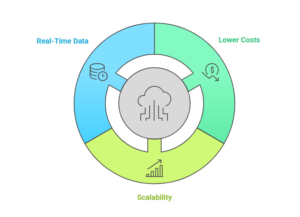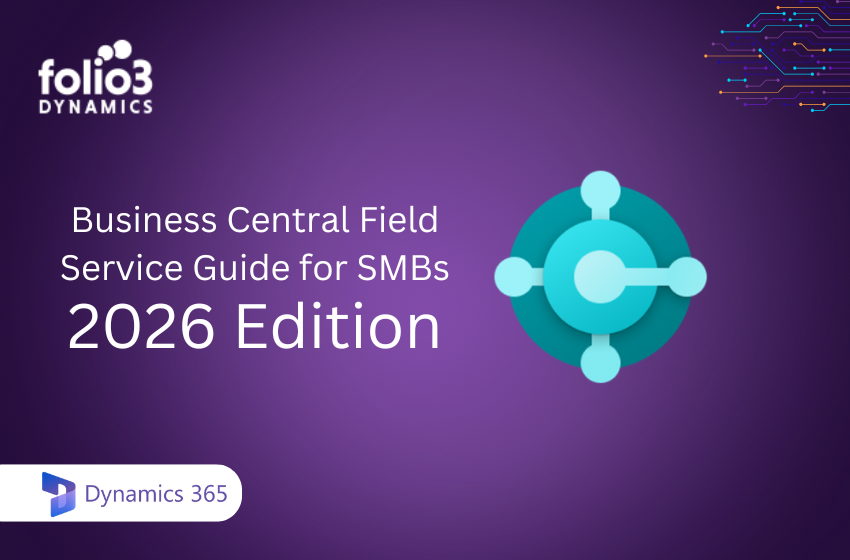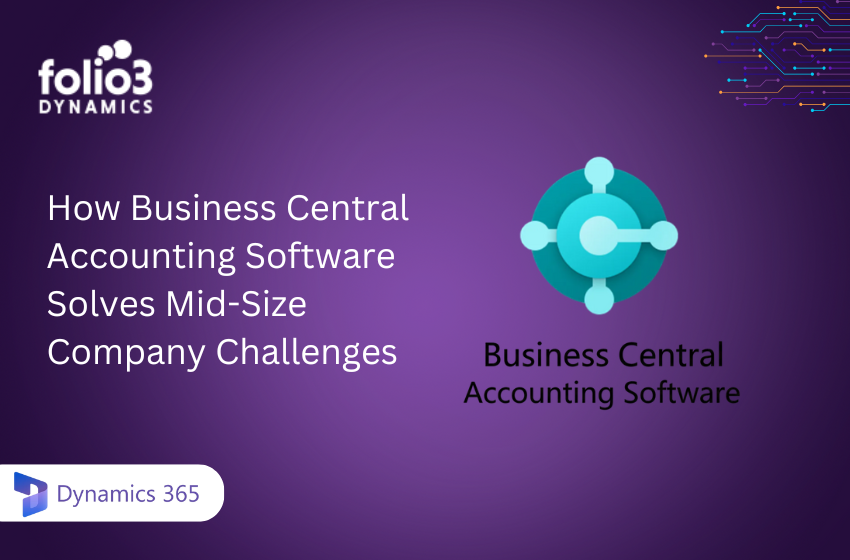“Efficiency is doing things right; effectiveness is doing the right things.” – Peter Drucker.
And when it comes to manufacturing, both efficiency and effectiveness are important.
The manufacturing sector is huge! According to Statista, the output in the manufacturing market is projected to be about US$49.3tn in 2025.it is not just growing but it is rather becoming facts paced than ever. Manufacturers drive more innovation than any other sector of the economy.
Manufacturing these days is no longer merely about assembling products, rather it is about taking market changes and demands ahead, improving operations, and staying ahead of technological advancements.
As we enter 2025, one of the biggest transformations in discrete manufacturing is the exponential adoption of cloud-based Enterprise Resource Planning (ERP) systems.
If you belong to this industry the you must have noticed how traditional on-premise ERP systems struggle to keep at par with modern demands.
Manufacturers are reverting towards flexible cloud solutions, provide real-time insights, and are cost-efficient This is because they want to free themselves from high maintenance costs, limited scalability, and disconnected data.
The shift to cloud ERP is becoming a necessity for manufacturers who want to remain competitive.
Let us discuss why cloud-based ERP is taking over discrete manufacturing, the core trends that are leading this shift, and how solutions like Microsoft Dynamics 365 are helping businesses make this change.
The Changing Landscape of Discrete Manufacturing
Discrete manufacturing is the production of individual items that are different from each other, such as automobiles, electronics, and machinery. In contrast to process manufacturing, which focuses on bulk production of products.
Discrete manufacturers have to manage complex supply chains, variable demand, and strict quality requirements.
During the past few years, digital transformation has remodeled how manufacturers operate. Operational agility and real-time data access are more crucial than ever due to factors including automation, sustainability, and global supply chain disruptions.
This is the turning point at which cloud ERP systems are invaluable.
Why Cloud-Based ERP Is Becoming Mandatory?

1. Lower Costs & Better ROI
An on-premise ERP system is expensive to operate. You have to pay for frequent upgrades, security, maintenance, and infrastructure.
These expenses can be eliminated by implementing a subscription-based business model of cloud ERP such as Microsoft Dynamics 365, which enables manufacturers to devote their resources to production and innovation.
2. Scalability Without Limitations
Manufacturers function in a highly dynamic environment. Market demand fluctuates continuously and unpredictably, production volumes change often and new technologies take over.
A cloud ERP system is highly flexible and lets you scale operations up or down as needed. Businesses can quickly respond to seasonal trends or enter new markets owing to cloud solutions.
3. Real-Time Data & Accessibility
Timing and accuracy are highly important in manufacturing, a single delay or issue can disrupt the entire production process. Cloud ERP provides real-time data visibility of your supply chains, production lines, and customer orders.
Hence, helping decision-makers to respond quickly. Moreover, due to its cloud-based nature, your employees can access the system from anywhere and at any time. Whether they are working remotely or on-premise.
Top Trends Leading Toward Cloud ERP Adoption in Discrete Manufacturing
So what makes these CLoud-based ERP solutions so lucrative to manufacturers in discrete manufacturing? Let us have a look at some of the compelling reasons:
1. AI & Machine Learning for Smarter Decisions
Manufacturers are taking inventory, production, and quality control to a whole new level with the help of artificial intelligence (AI) and machine learning (ML). When manufacturers integrate AI with ERP systems, they can achieve the following :
- Predict demand fluctuations
- Improve inventory management
- Automate routine tasks and maintenance schedules
- Improve quality control through automated methods
With ERP systems such as Microsoft Dynamics 365 that AI powers, businesses can use predictive analytics to make data-driven decisions.
2. Industry 4.0 & IoT Integration
Industry 4.0 is the fourth industrial revolution. It is remodeling manufacturing with technologies like the Internet of Things (IoT) and smart automation.
Manufacturers can get real-time visibility into equipment performance, predictive maintenance alerts, and automated workflows by integrating IoT with cloud-based ERP.
For example, data collected from IoT sensors on machines can be sent to the ERP system, initiating automatic repair requests to be made before equipment malfunctions.
This increases the lifespan of expensive equipment and reduces downtime.
3. The Push for Sustainability & Green Manufacturing
As the conservation of resources becomes a top priority, sustainability is no longer a term that we use, rather it has become a core business requirement.
With each passing day regulatory bodies are implementing stricter environmental policies and consumers now prefer ethically sourced and eco-friendly products. Thus mandating manufacturers to adopt greener practices.
For example, Dynamics 365 can monitor energy consumption, material use, etc, thus, pinpointing areas for improvement and making sure that your operations meet sustainability goals.
Cloud-based ERP solutions play a vital role in this shift by:
- Tracking energy consumption and waste
- Making supply chains efficient to minimize carbon footprints
- Helping with predictive analytics to reduce excess inventory and waste
With the help of powerful tools like Dynamics 365, manufacturers can efficiently track resource usage and warrant compliance with sustainability goals.
4. Strengthening Supply Chains with Cloud ERP
For manufacturers, supply chain interruptions continue to be a significant problem. Businesses require greater visibility and control over their supply chains to handle recurring issues like material shortages and logistical delays.
A cloud ERP system centralizes supply chain management by:
- Enabling real-time tracking of shipments and inventory
- Automating procurement and vendor management
- Making communication with suppliers and distributors smooth and easy.
Having a cloud ERP guarantees that all supply chain components are connected, minimizing risks and improving productivity for manufacturers operating at multiple locations.
5. Customer-centric Experience
Amongst your various stakeholders, the customer holds the most importance. Customer experience is equally important as product quality.
Cloud-based ERP systems now integrate with Customer Relationship Management (CRM) tools and help manufacturers to:
- Provide personalized services
- Boost response times
- Improve order tracking and customer support
With the help of Microsoft Dynamics 365, businesses can unite sales, customer service, and manufacturing processes to raise overall customer satisfaction.
Dynamics 365 Empowering Discrete Manufacturing
There is a myriad of cloud ERP solutions in the market,h owever, Microsoft Dynamics 365 stands out for its ability to handle the complex needs of discrete manufacturers. Some of its key features include the following:
1. Shop Floor Management
All the manufacturing magic happens on the shop floor, and Dynamics 365 provides all the tools required to manage schedules, measure performance indicators in real time, and refine operations. Manufacturers can quickly detect inefficiencies and implement fixes that improve processes.
2. Quality Control
Maintaining product quality is the ticket to long-term success. Dynamics 365 comes with integrated quality management features that enable businesses to monitor production standards and implement quality checks in the entire manufacturing process. This helps in reducing defects and boosting customer satisfaction.
3. Project Management
Effective project management is a must for discrete manufacturers. With the help of Dynamics 365’s powerful project management features, teams can efficiently plan, execute, and monitor projects to make sure they are finished on time and within budget.
Steps For a Smooth Transition To Cloud ERP & A Better Future
Businesses need to be proactive about employing cloud-based ERP solutions as the manufacturing sector shifts. The future of discrete manufacturing will be a combination of AI, Industry 4.0 technology, and sustainability practices.
Businesses that embrace these developments will have a high chance of success. Thinking about making the shift now? Here is how to have a smooth transition:
1. Define Your Business Needs
Start by Identifying gaps in your existing ERP system and give priority to features that will help you achieve your long-term goals.
2. Invest in Training
Training your employees is necessary when implementing a new system. Verify that staff members are proficient in using the new ERP.
3. Start with a Phased Implementation
Rolling out an ERP system all at once can be challenging and risky. A phased approach helps minimize disruptions and lets teams adapt gradually.
4. Choose the Right ERP Partner
This is the most important factor, that can define your future success with the new ERP. Partnering with an experienced ERP provider will result in a smooth implementation process. Working with experts can help manufacturers overcome the challenges and maximize their cloud ERP systems to boost efficiency.
Conclusion
Cloud-based ERP is at the heart of the major transformation that the manufacturing sector is going through. Embracing this change will give businesses an edge over their competitors with the help of greater operational agility, real-time insights, and cost savings.
If you are searching for a solution that will give you everything that matters, such as efficiency, scalability, and affordability, then cloud ERP platforms like Microsoft Dynamics 365 are worth a try.
By employing the latest advancements in AI, IoT, and sustainability practices, manufacturers can secure their future and gain success in the long run.
The future of discrete manufacturing belongs to those who adapt. Are you braced to move forward?


